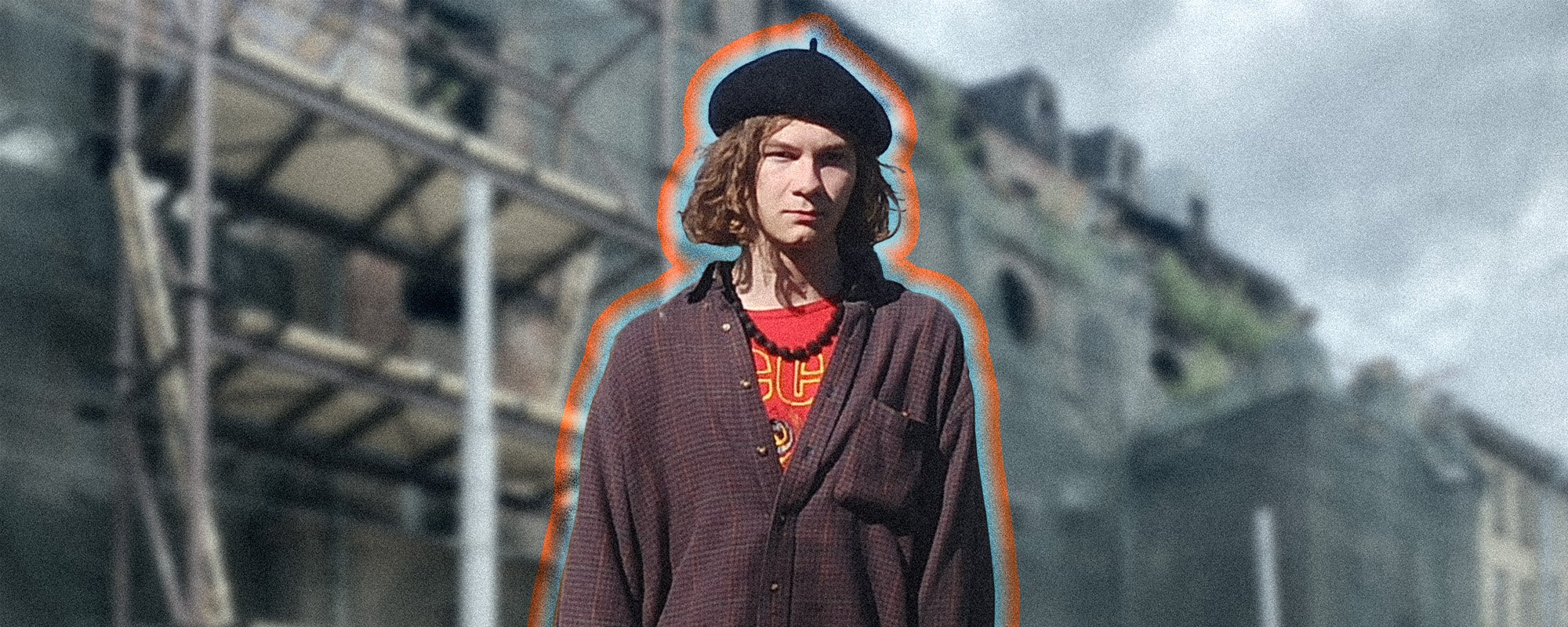In Russia, cultural preservation activists who defend local heritage often face pressure from authorities. When Putin invaded Ukraine, student Kirill Kaverin did not think of the war as «categorically bad». One year and eight months later, Kirill was detained for 12 days for defending the historic Basevich house building and expelled from university. The 20-year-old’s views began to change. And here’s how.
Before the Basevich house incident, I had only been detained once. It was in spring, when my classmate Dmitry Andreenko and I were walking past the Volkovskaya metro station and noticed an abandoned car number plate near one of the houses. I picked it up, put it in my backpack, and it stuck out a bit. I was thinking I would hang it on the wall in the dormitory. Suddenly, we saw police cars. [The officers] stopped us and said they had got a tip-off about us. So they took us to the police station, and we were stuck there for two hours. First, they confiscated the number plate, then they gave it back. We also had two unopened cans of beer in our backpack. The police took those too and they didn’t want to give them back. Well, Dmitry went to sort it out, and he brought the beer back. The policemen said: «Do you mind about the beer? Buy a new one». We replied: «We do mind».
«Crazy and funny»
In 2021 I moved from Krasnogorsk, a town near Moscow, to St. Petersburg to study political science at the St. Petersburg State University. I’d been interested in it probably since 2017, when there were public protests (a series of anti-corruption rallies organised by Alexei Navalny and his supporters — OVD-Info). A couple of years later, a subcultural trend for politics started in Russia: social media pages like «Plum», «Memes for Russians», «Libertarianism in diagrams and memes» and so on. I think they had a big impact on young people’s political socialisation.
I liked studying at the Faculty of Political Sciences. First of all, I liked the atmosphere itself: the Faculty of Political Sciences is located in Smolny (in one of the historical buildings of the Smolny Convent, an 18th-century architectural monument — OVD-Info), next to the [eponymous] cathedral. This is one of the most beautiful educational institutions not only in Russia, but probably in Europe as well. You can compare it to Oxford. It looks very cool, even too prestigious. In my first year, we had lectures in a former chapel, in a room with strange acoustics.
Secondly, at the Faculty of Political Sciences, I found my people — as the song goes, «crazy and funny, crazy and mad» (from the song «Zoo» by the Russian rock band «Grazhdanskaya Oborona» — OVD-Info) — and made friends with them. All I can say about the educational process itself is that the lecturers at SPbU are competent.
It was actually my classmate Dmitry Andreenko who got me into historic preservation activism. We walked around the city a lot, rode the trams. I became interested in architecture and felt that I had to do something. I was not involved in historic preservation activism before, and I regret that.
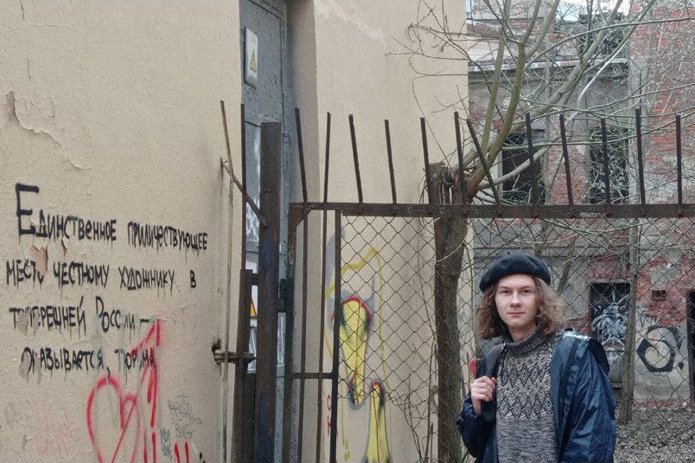
In Krasnogorsk, there aren’t any activists like the ones in St. Petersburg. But we do have a neighbourhood called Bruschaty village (a small town near Moscow, founded as a home for workers of a nearby factory — OVD-Info), which was built in the 1930s. And apart from it, there is nothing in Krasnogorsk that you could say is distinctive to our city. During World War II, Bruschaty was converted into a POW camp, and high-ranking German prisoners were held there, for example, [Field Marshal Friedrich] Paulus (commander of the 6th Army that surrendered at Stalingrad — OVD-Info).
Now in this neighbourhood, there’s a municipal Museum of Anti-Fascists (named after the Central Anti-Fascist School, where Axis prisoners of war were re-educated — OVD-Info). More precisely, when I was looking for it on the map a month ago, it turned out that it’s now called «a branch of the Victory Museum». I didn’t even understand why and when it had been renamed like that.
Now only a couple of buildings of the original Bruschaty village are left. It was all demolished and replaced with high-rises. I look at the model of the neighbourhood shown in the museum and I think: «What a shame». If the village had been preserved, tourists would be coming here. Well, unfortunately, no one protected it. And it’s like that everywhere.
The visit of a person from the Center for Combating Extremism
There’s a great variety of people in St. Petersburg urban preservation. Even regarding the war, there are diametrically opposite views. Maybe it would be better if everyone had the same views, but I can’t say this somehow gets in the way of the common cause. Yes, I know that St. Petersburg city preservation activists wrote to Alexander Bastrykin (starting in the summer of 2022, a number of activists signed around ten letters to the head of the Investigative Committee with requests to protect various city facilities, and also sent letters of gratitude and birthday greetings — OVD-Info).
Of course, one can argue that Bastrykin is a representative of the system, and the system is no good. On the other hand, you can’t seriously think that everything can be solved with the force of horizontal organisation. Interaction with the system is inevitable.
I found out about the Basevich house this spring, just before its demolition. On 24 May an activist who was in the house wrote to Pasha [Shepetkov] (one of the preservation activists — OVD-Info). The signal kept breaking up, it wasn’t clear what was happening to him. At that moment, demolition was in full swing.
There was nothing else that could be done, so we (Kirill, Pavel and another activist Igor Kuznetsov — OVD-Info) went to the construction site. It was open, we just went through the gate in the construction fence. We immediately shouted: «Man in the building, stop the construction!» Then Igor and Pasha ran, they got doused with water by the workers. I was immediately pinned down by some builders, put on the ground, choked like George Floyd, and held like that for 10 minutes. At the same time, there was a verbal altercation with the boss [for the construction of the Design and Construction Agency «Zhilstroy» Dmitry] Mikhailov (responsible for the reconstruction of Basevich’s house — OVD-Info), who said that he was offered money to deal with us — and he made a throat-slitting gesture. Then the police and an ambulance arrived, they looked me over — I only had light scratches.
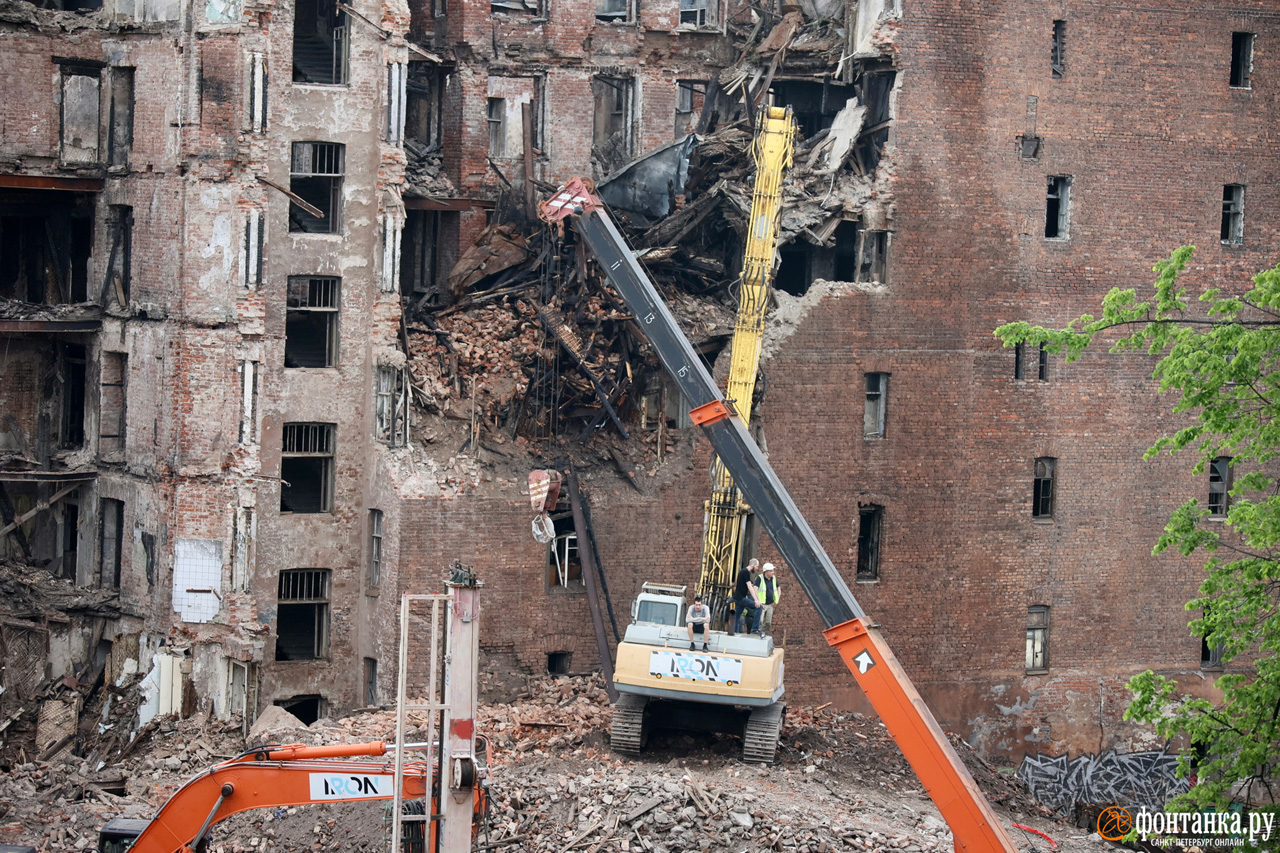
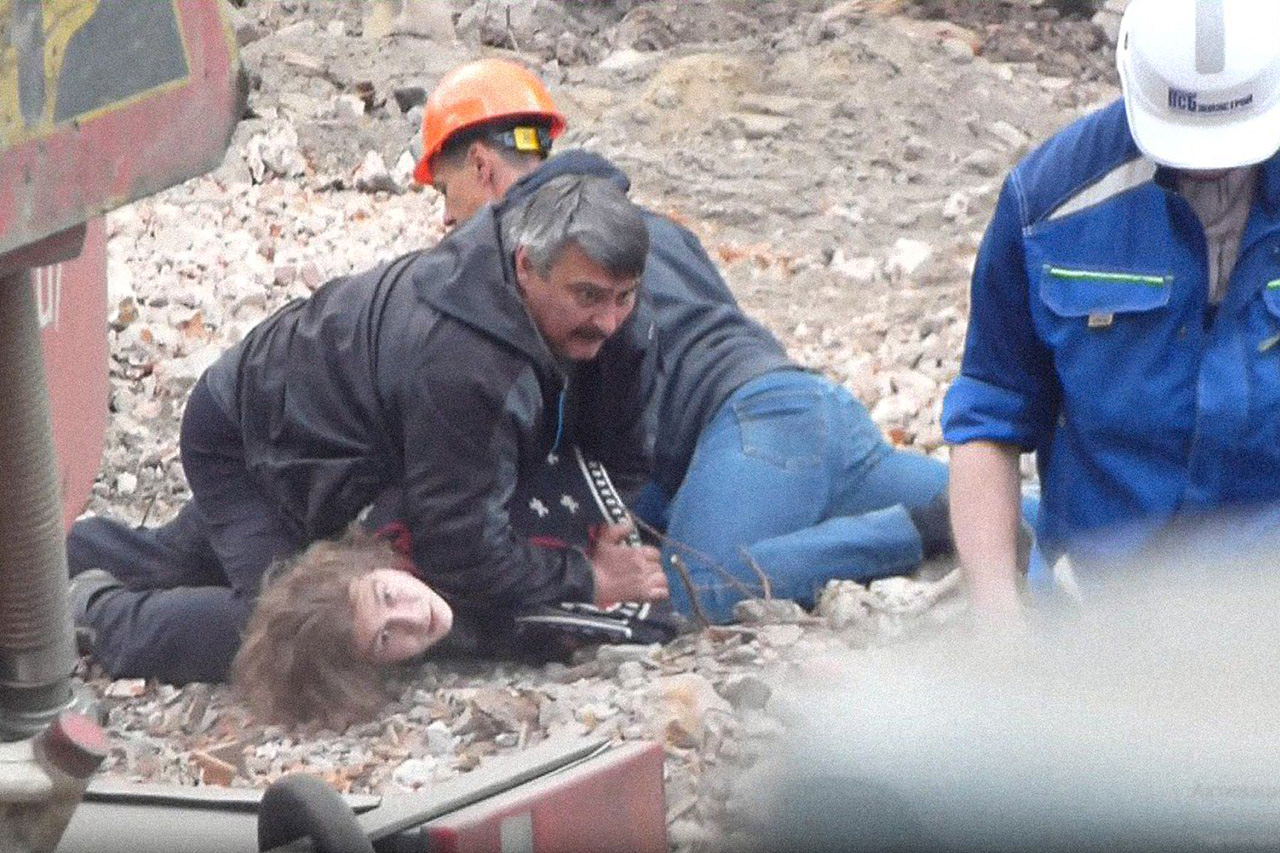
We were taken to a police station. We thought that it would be fine — a 500-ruble fine (~5,6 US$) at most: we did not (and still do not) feel like we had done something seriously illegal. And then an official from the Center for Combating Terrorism arrived. As far as I could tell, his name was Aram Khachatryan: I identified him from a photo that was shown to me by the journalists of the «Sever.Realii» (media project of the Russian Service of Radio Liberty covering the Northwestern Federal District — OVD-Info).
And so he started to pressure us, and he used really obscene language. He insisted on us going out to talk with him one-on-one. When he found out that I was a student, he said that I would have the biggest problems. My guess is, he wanted to link us to some kind of political group or a paid political movement. We refused to talk to him without our lawyer (lawyer Sergei Podolsky — OVD-Info), and the official left.
We spent the night in the holding cell, the next morning there was a trial. Everyone, even our guards, were surprised that they put us behind bars for so many days (Kirill was jailed for 12 days, Pavel and Igor — for 14 days — OVD-Info). After the trial, we were brought back to the department under the pretext of fingerprinting and kept there for three or four hours. They brought in another urban preservation activist, Alexey [Osokin]. A criminal investigation officer arrived. We sat in the holding cell and watched as he asked Alexey: «How much do they pay you? What is the layout of your apartment?» Then he tried to take us out one by one, just the same way [as the employee of the Center for Combating Extremism]. We refused again, and he left, slamming the door hard.
«Russian Field of Experiments»
It was summertime, and I thought that what happened in May had already been forgotten. On 31 August, I was scrolling through my corporate email and saw an exclusion order. The wave of anxiety swept over me, but I hoped that everything would be fine. However, the Youth Affairs Department told me that my expulsion was without the right of reinstatement — that is, I could only re-enter as a first-year student. The reason cited was a violation of the university’s rules.
To be honest, I didn’t want to publicise my expulsion at first — I decided to just «slam the door behind me» without looking back. That’s why the information about it appeared only a month later. I have never seen the documents that led to the expulsion (including some letters from the St. Petersburg Main Department of the Ministry of Internal Affairs and the Russian Ministry of Science — OVD-Info). They say it’s difficult to get ahold of them at all: SBbSU doesn’t provide them.
My parents did not like the news. They were upset. And that, of course, is the most unpleasant part. They are not against my civic activism, they just don’t see the point in it. They don’t understand it, much like many other people who wonder, «Why, when you could just live peacefully?»
Now there is a threat of conscription, and being drafted into the army (Russia has a mandatory draft but students are exempt, getting kicked out means one loses the student protection — OVD-Info). I wouldn’t want to end up there, especially now.
I don’t know if I have it in me to apply to university again. In any case, I would choose a different field: perhaps design, like I wanted in the 10th grade. I also want to open a second-hand store in Moscow, full of interesting things. I don’t know how realistic that is. As for my more immediate plans: releasing a documentary about the music of the 2020s in Russia on my YouTube channel «yugent!» — a film I have been working on for the past year.
Over the last year and a half, my views have been in flux. At the beginning of the war, like many others, I didn’t have the idea that it was categorically bad. You could say that my attitude was a kind of a compromise. Then my opinion started to change, influenced by both the arrest and my frequent clashes with the police.
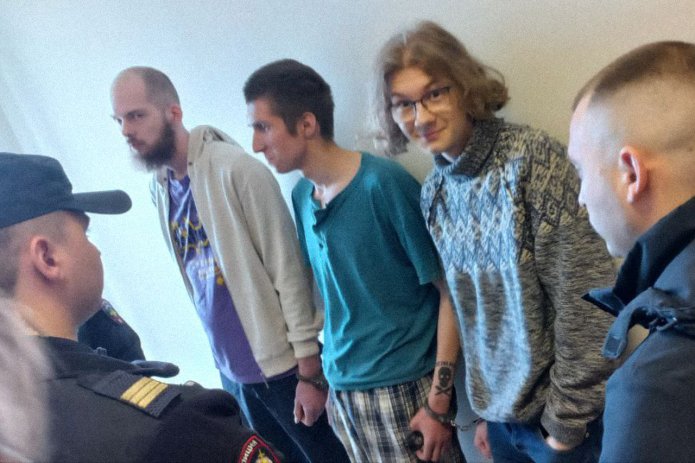
There was another incident besides the licence plate. In the summer, Dmitry Andreenko, the classmate I was first detained with, visited Moscow. We went to the Losiny Ostrov park. We walked around for 20 minutes and there was nothing to do, so we went to the MCC (Moscow Central Circle metro line). We ran into the police there, they started questioning us and demanded to see our phones. They went through all our messages and our Yandex Maps history. Initially, I thought the search was about politics, but then I realised they were looking for information on [drug] stashes.
And it’s happening all the time now. There’s this feeling that they can come after anyone at any time, that the system could do something to you. Some people feel hatred, but for me it’s more like fear. I don’t see anything good in this. If we continue down this path, in just ten years, everything will be very bad in Russia.
But I don’t want to leave; I love my yard, my pond… I don’t know what else to say. It’s a «Russian Field of Experiments» (the title of another song and also an album by «Grazhdanskaya Oborona» — OVD-Info). It’s sad, that’s what it is.
Recorded by Galya Sova



